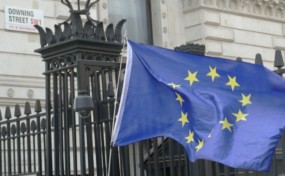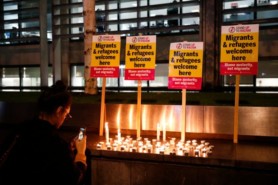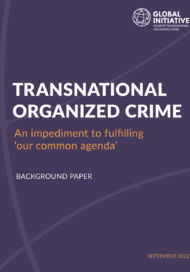Posted on 18 Mar 2020
In a recent publication, we asked whether Brexit will see organized crime taking back control. Here we consider the impact of Brexit on modern slavery in the UK and whether it will diminish the effectiveness of the UK’s response to slavery now that the UK is no longer a member of the EU.
Research ranks the UK number one in the world for its response to modern slavery. However, the impact of the Modern Slavery Act 2015, legislation that was lauded as
ground-breaking when it was enacted, is generally considered to have fallen
below what was hoped for.
Now Brexit poses further challenges to the effectiveness of the UK’s response to modern slavery. These can broadly be categorized as threefold: the country’s increasingly restrictive immigration policy; less cross-border information sharing with European neighbours; and questions regarding how the state will safeguard victims of slavery.
A more restrictive immigration system
The UK’s restrictive immigration policy has been identified as consistently
undermining its efforts to combat modern slavery. For example, the introduction of a criminal offence for ‘illegal working’ under the Immigration Act 2016 caused concern among practitioners that many survivors of modern slavery would find themselves prosecuted for illegal working by the authorities, instead of receiving the appropriate support.
The new points-based immigration system announced by the UK government may well be the latest step in this trend. The system is part of the government’s rhetoric for taking back control of the country’s borders and seeks to ‘reduce overall levels of migration’, according to the policy statement.
Global experience shows that limiting legal pathways for migration into states is likely to swell the demand for smuggling services to facilitate irregular entry. People who enter the country irregularly become particularly vulnerable to exploitation by organized criminal groups and informal employers. Governments implementing these strict immigration policies lose out financially in the end, as the informal labour of irregular migrants is outside the formal income tax system, and thus presents a significant revenue shortfall to the state.
The proposed points-based immigration framework claims emphatically that it will ‘not introduce a general low-skilled or temporary work route’, even though there is significant demand from industry for such labour. The risk is this will swell the demand for smuggling services, providing a pool of irregular migrants to meet the demands of formal and informal industry. Such irregular migrants enjoy only tenuous legal rights in the country, and typically cannot access the formal labour market. And they are unlikely to report abuse to state authorities for fear of being deported. This means that irregular migrants would become highly vulnerable to exploitation within the informal labour market, as well as at the hands of organized-crime groups.
It is crucial therefore that the government fully assesses the possible impact of the points-based framework on irregular migration into the UK, and on domestic modern slavery dynamics. It is not sufficient to state that ‘employers will need to adjust’. The scale of the shortfall in this segment of the labour supply market feared by businesses needs to be assessed, and this information should be central to informing the proposed policy.
In its policy statement regarding the new immigration framework, the government states that it remains committed ‘to protecting individuals from exploitation by
criminal traffickers and unscrupulous employers’; greater detail is needed as
to what this protection means. A failure to take into account the impact of the
new policy on irregular migration could have long-term consequences for the
prevalence of exploitation of people in the UK contexts of modern slavery.
Limited cross-border information sharing
From an operational perspective, Brexit poses innumerable new challenges to law enforcement in the UK in terms of addressing organized crime. As analyzed in the earlier blog, one of the most concerning of these will be the predicted decrease in intelligence sharing, after the end of the transition period. This carries significant
risks for dealing with modern slavery in the UK, which is not a phenomenon that
can be tackled by UK law enforcement in isolation.
As we highlighted, although the UK’s terms for cooperation with EUROPOL and Eurojust are still under discussion, it is more than likely that collaboration will be diminished, and the UK’s access to real-time data will be replaced with a more limited case-by-case request system. In the context of human trafficking and modern slavery, this undermines hard won gains in an area where the UK can, and to date has, played a global leadership role.
With the limited exception of those who are flown into the country directly, all foreign national victims of modern slavery in the UK must transit through the UK’s European neighbours. Cooperation with these transit and origin states is therefore clearly paramount to crafting an effective response.
Cross-border information sharing was key in the 2019 break-up of the largest UK modern slavery ring to date. An investigation led by UK law enforcement culminated in the arrest of eight Polish gang members who police believe trafficked over 400 victims from Poland to the UK, where they were held in contexts of labour exploitation. (The National Referral Mechanism statistics show that European nationals, particularly Poles and Romanians, constitute a significant proportion of modern slavery victims in the UK.) The perpetrators recruited vulnerable victims in Poland with promises of well-paid work in the UK, and used high levels of violence to assert control over their victims once they were in the UK.
EUROPOL resources and collaboration have been at the heart of a number of successful investigations into modern slavery rings operating in the UK and the EU. For example, in November 2019, close collaboration between the UK’s South Yorkshire Police and the Romanian National Police, supported by EUROPOL and Eurojust, led to the dismantling of an organized-crime group trafficking women from Romania to the UK for sex work. Coordination was critical, resulting in simultaneous raids on the perpetrators’ premises in Romania and the UK to avoid gang members becoming aware of the operation.
The UK has been at the forefront of shaping the EU’s response to modern slavery and human trafficking in the past few years, with the UK National Crime Agency chairing EUROPOL’s Trafficking in Human Beings Group until April 2019, and leading on the EU’s strategy and programming to tackle labour exploitation, child trafficking and use of the internet by traffickers.
Weaknesses in safeguarding victims
While reform in this area is recognized as crucial, Brexit has been a black hole for legislative and policymaker focus, pushing such concerns to the margins of government.
The 2019 House of Lords Independent Review of the Modern Slavery Act, while recognizing its impact, also highlighted a significant number of areas where the response could be improved. The review focused on transparency in supply chains, the role of the Independent Anti-Slavery Commissioner, the Act’s legal application, and the safeguarding of child victims of modern slavery. The review identified
weaknesses in each of these areas, highlighting victim support as a particular
area of concern. The government committed itself to implementing the majority
of the recommendations made by the Independent Review Committee.
Legislative change is required to incorporate a number of these recommendations into the Act, including strengthening the obligations on private-sector companies
in publishing their human trafficking in supply chain statements, and to put
more extensive support for victims of trafficking on a statutory footing.
Unfortunately, however, Brexit has swallowed the parliamentary timetable and a
significant proportion of policymaker focus, leaving scant time for focus on
other matters.
Further, the December 2019 election sent the vast majority of bills that had not completed their passage through Parliament back to the beginning of the parliamentary process.
This was the case with the Modern Slavery (Victim Support) Bill, which would give victims of modern slavery at least 12 months of support (and the right to stay in the UK during that period) following an assessment. Shortfalls in the provision of support for victims of modern slavery were identified as a key weakness in the framework provided by the Modern Slavery Act 2015.
After the Home Office’s policy of granting victims 45 days of support was deemed
unlawful by the UK High Court in April 2019, the department withdrew
its policy and has introduced a system of case-by-case analysis built
around victims’ needs. However, there has been significant pressure to bring
greater clarity to the provision of victim support, and place it on a statutory
footing.
The date for the Bill’s second reading at the House of Lords is yet to be announced, after which it shall proceed through the House of Commons. The extent to which a full parliamentary timetable will delay the process is yet to be determined.
More broadly, a number of the protections currently available to victims of modern slavery in the UK stem from EU legislation. There is now the risk that Brexit will significantly dilute these and that either through intention or a time-poor Parliament, this will not be balanced through new domestic legislation.
Gold standard no more?
If the UK is to remain a world leader in the response to addressing the phenomenon of modern slavery, the challenges posed by Brexit will need to be navigated.
In the Conservative manifesto, Boris Johnson promised Brexit on the one hand, and to ‘eradicate human trafficking and the scourge of modern slavery’ on the other. However prima facie information would suggest the former poses significant challenges to the latter.
Key to crafting a robust and forward-looking response will be to ensure that sufficient policymaker and parliamentary time is dedicated to implementing the reforms desperately needed to enhance the UK’s approach to human trafficking and modern slavery, and safeguarding intelligence sharing to the greatest extent possible despite the UK’s changing place on the continent.
The government should carefully consider the possible impacts of its new immigration system on human trafficking and modern slavery in the country, and take the concerns of industry and the third sector into account in finalizing this framework.
A failure to do so could tarnish the UK’s gold-standard framework for countering modern slavery, and significantly compromise the effectiveness of its response, with dire consequences for the individuals caught in contexts of exploitation.



